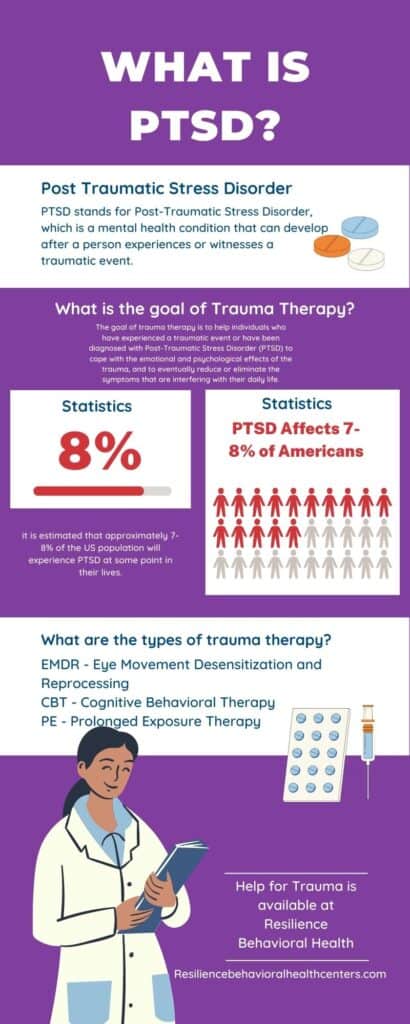PTSD with EMDR Therapy Massachusetts: Case Studies
Not to sound poetic but life isn’t always smooth and joyous for everyone. Even at this instant, while some of you may be relishing the best moments, others are going through the hell of challenging times. The article below will explain the benefits of treating PTSD with EMDR Therapy Massachusetts.
You see, unexpected challenges often leave imprints on our minds, and for many, that challenge is post-traumatic stress disorder (PTSD). If you’ve experienced it, you know the toll it takes on your daily life. One recent research says that PTSD symptoms can be a high-risk factor for suicide. Well, that’s the extreme we’re talking about. There are many other symptoms of PTSD, including detachment, isolation, feeling on the edge, weak concentration, troublesome sleep, and more.
Terrifying, but that’s what many people go through. Just to remind you – it is completely okay to feel things about your past traumatic experiences. What’s not okay is letting those painful memories consume you day in and day out.
So, let’s talk “hope”.
For those currently facing difficulties, you must know that challenges are a shared aspect of the human experience. In this exploration, we aim to shed light on the transformative potential of Eye Movement Desensitization and Reprocessing (EMDR) therapy, offering hope and healing to those walking challenging paths alone.
So, how does EMDR therapy work for individuals dealing with serious PTSD? You’ll discover the answer and go through successful case studies of PTSD treated with EMDR in Massachusetts.
But What is EMDR Therapy and How it Works?
EMDR therapy Massachusetts is a structured form of psychotherapy designed to help individuals who have undergone distressing or traumatic events. According to clinical psychologist Steven Silver, PhD, coauthor of the book “Light in the Heart of Darkness: EMDR and the Treatment of War and Terrorism Survivors,” the concept behind EMDR is that unprocessed traumatic memories can get “stuck” in the brain, resulting in a range of emotional and psychological challenges.
Individuals who have faced trauma often find themselves repeatedly revisiting memories of past events, leading to disturbances, explained Silver. These unresolved memories can contribute to conditions such as:
- Anxiety
- Depression
- PTSD, and
- Other trauma-related issues.
Silver noted, “The brain, among other things, is always trying to solve problems.” For those with PTSD, the mind may pose questions like, ‘All my friends are dead; why am I still alive?’ The persistent search for answers can lead to recurrent dreams, intrusive memories, and flashbacks.
EMDR tackles the ongoing challenges faced by PTSD patients by leveraging the brain’s innate ability to heal and process traumatic experiences, Silver emphasized. “EMDR has shown us that our brains are a lot more powerful than we originally thought they were,” he added.
Notable Veteran study confirms that EMDR stands out as a top-notch treatment for PTSD worldwide. It’s backed by respected organizations like the World Health Organization, the American Veterans Association, and the International Society for Traumatic Stress Studies.
During sessions, clients usually meet with their EMDR therapist once a week for 60-90 minutes.
Is EMDR Trauma Therapy Effective for PTSD?
The effectiveness of EMDR in treating PTSD has been extensively researched, making it a focal point in numerous studies. The Francine Shapiro Library boasts over 2400 listings and more than 30 randomized controlled trials provide compelling evidence of EMDR’s efficacy in managing severe mental health conditions, particularly PTSD.
Results from these studies indicate a noteworthy reduction of 36-95% in PTSD symptoms by the conclusion of treatment. Additionally, findings show that 16 out of 19 participants no longer met the diagnostic criteria for PTSD after undergoing EMDR treatment.
This therapy is highly recommended for PTSD treatment by numerous authoritative bodies both nationally and internationally. Endorsements include:
- American Psychological Association,
- American Psychiatric Association,
- Department of Veterans Affairs, and Department of Defense,
- International Society for Traumatic Stress Studies, and
- National Institute for Health and Clinical Excellence.

Now, How Does EMDR Therapy Assist in Managing PTSD?
EMDR is effective for PTSD as it specifically targets the brain’s memory centers, focusing on particular events, triggers, and neurological associations. What sets EMDR apart is its use of dual attention stimuli (DAS), which aids in desensitizing traumatic content, reducing the impact of common PTSD symptoms like flashbacks, sound or smell triggers, and hypervigilance.
Unlike other therapies that necessitate detailed event sharing, EMDR does not require extensive verbalization, and treatment is typically less exhaustive and short-term. Positive treatment effects can be experienced by individuals dealing with PTSD after just a few sessions.
EMDR for PTSD leverages the nervous system’s inherent healing mechanisms through the following phenomena:
- Desensitizing past traumatic memories, preventing them from triggering an emergency response in the body.
- Teaching the brain to accurately orient to time and place. It’s where you shift to think that the traumatic event is over and in the past.
- Engaging with the upper cortex of the brain for rational reasoning ultimately allows the brain to think more accurately and unlink from irrational cognitive distortions like “Whatever happened was my fault!” or “I am hard to love.”
- Reducing the vividness and/or intensity of stimuli which is linked to specific traumatic memories.
- Activating your parasympathetic nervous system, promoting a return to a state of ease, a neutral to positive outlook, and facilitating physical healing through “rest and digest.”
Addressing PTSD with EMDR Therapy: Massachusetts Successful Case Studies
Background and Challenge
Mike, a 32-year-old Iraq War Veteran, sought relief from posttraumatic stress disorder (PTSD) resulting from two tours of duty as a flight medic. Discharged from the Army, divorced, and grappling with the emotional aftermath, Mike faced challenges that impacted his well-being and relationships, particularly with his 2-year-old son.
EMDR Process and Outcome
This case exemplifies the application of Eye Movement Desensitization and Reprocessing (EMDR) therapy for treating PTSD, with conditional endorsement from the APA Clinical Practice Guideline.
EMDR Phases:
The eight-phase EMDR approach commenced with history-taking and preparation. Mike identified distressing events, including a childhood incident and combat-related memories. The seventh session, detailed here, targeted a mass casualty incident involving a soldier’s severe injuries.
Session Outcome:
Mike’s session involved the Assessment phase, exploring components of the traumatic memory. Despite initial agitation, the session led to desensitization of distress and cognitive shifts. Mike reframed his role, realizing he wasn’t at fault for the soldier’s death, shedding guilt and shame. He reported feeling lighter and carried the memory with pride.
Here we have spilled an entire journey of Mike who transformed from the excruciating phase of trauma to eternal healing. There are countless success stories and cases that we attempt every day here at Resilience Behavioral Health in Massachusetts. Big shoutout to our EMDR-trained and certified therapists who always go beyond lengths to of making sure each session makes our clients feel lighter.
Wrapping It Up!
The insights gained from the EMDR trauma therapy case study and techniques are a source of great hope for those trapped in the aftermath of traumatic experiences. If you’re grappling with PTSD, exploring EMDR treatment holds promise. Proven and effective, EMDR yields significant, short-term results, often providing relief without the need for detailed memory disclosure. Hopefully the above article was helpful and informative for Treating PTSD with EMDR Therapy Massachusetts.
Take a step towards healing by considering EMDR therapy. Connect with Resilience Behavioral Health for a stress-free experience. Visit the contact page or call 888.401.1179 to speak with your dedicated health representative today.


